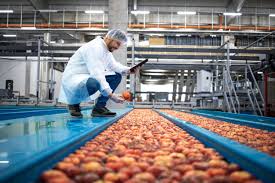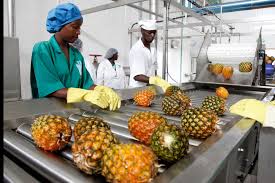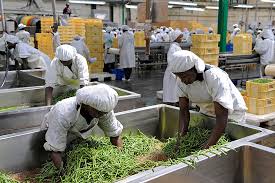Agricultural products, including crops and livestock, in many less developed countries are often sold as primary products both locally and internationally, resulting in low prices. This situation leads to the impoverishment of farmers due to the low income generated from farm business enterprises.
Primary products such as cocoa, kolanut, and maize are processed by foreign business partners into secondary products like beverages, coffee, and baby foods, which are then sold back at exorbitant prices, making essential goods unaffordable for low-income earners.
Agricultural processing adds value to raw products, generates more income, and creates job opportunities. The subsector of the manufacturing industry that processes raw materials and intermediate products from the agricultural sector is known as agroprocessing or the agricultural processing industry. Agroprocessing involves transforming products from agriculture, forestry, and fisheries into more valuable forms.
Meaning and Importance of Agricultural Processing
Agricultural processing refers to the series of activities involved in transforming agricultural raw materials into processed products. This process changes agricultural products from their original state into a more valuable form. While many raw agricultural products possess intrinsic value, agricultural processing increases their worth, leading to what is termed value-added agriculture.
For instance, processing wheat into flour, cassava tubers into cassava flakes (gari), and cocoa into beverages are examples of value addition. The application of biotechnology, the engineering of food from raw products to consumers, and the restructuring of distribution systems provide opportunities to enhance the value of agricultural products.
Value-Added and Value-Added Agriculture
In a broad sense, value addition involves economically enhancing a product by altering its place, time, or characteristics to make it more desirable in the marketplace.
A more specific definition of value-added in agriculture involves transforming an agricultural product, such as wheat, into a more refined product, like flour, which can then be used to produce items like bread.
Farmers and producers involved in value addition often consider themselves part of a larger food company that processes and markets products to consumers. This sometimes requires the establishment of processing plants in suitable locations where the business can thrive and be profitable.
Read Also: Mycotoxins and it’s importance in Pig Farming Business
Importance of Agricultural Processing

The agricultural processing sector is crucial for the growth and development of economies in less developed countries (LDCs). Some key contributions of agricultural processing include:
i. Increasing the gross domestic product (GDP) by providing additional goods and new processed products in the country.
ii. Boosting the income of processors and farmers engaged in processing activities.
iii. Generating employment opportunities for the population of LDCs. Industries in Nigeria that provide employment through agricultural processing include breweries, feed mills, textile industries, soft drink manufacturers, and bakeries.
iv. Bridging the income gap between rural and urban populations, due to the strong backward linkage to primary agriculture.
Read Also: How to Setup Your New Pig Farm- Beginners Guide

v. Reducing rural-urban migration as a result of the narrowing income gap between rural and urban areas.
vi. Creating new export opportunities and reducing dependence on a monoculture economy, particularly Nigeria’s reliance on oil.
vii. Increasing net exports for Nigeria and other LDCs through higher prices for agricultural exports.
viii. Providing training to unskilled employees and offering fringe benefits, thus improving education and living standards in underdeveloped areas.
ix. Stimulating agricultural production by creating stable intermediate markets for raw agricultural products and helping producers improve their farming skills through vertical integration and production contracts with processors.
x. Strengthening relationships with other important sectors of the economy, such as grocery and wholesale sectors, which generate thousands of jobs. The service sector and the growing tourism industry also create expanding demand for processed food products.
Agricultural processing plays a vital role in transforming agricultural products from their original state to a more valuable form, leading to the development of value-added agriculture. The economic importance of agricultural processing includes increasing farmer income, boosting GDP, and generating employment opportunities, all of which contribute to the growth and development of less developed countries.
Do you have any questions, suggestions, or contributions? If so, please feel free to use the comment box below to share your thoughts. We also encourage you to kindly share this information with others who might benefit from it. Since we can’t reach everyone at once, we truly appreciate your help in spreading the word. Thank you so much for your support and for sharing!
Read Also: Benefits of Integrated Biomedical Waste Management

